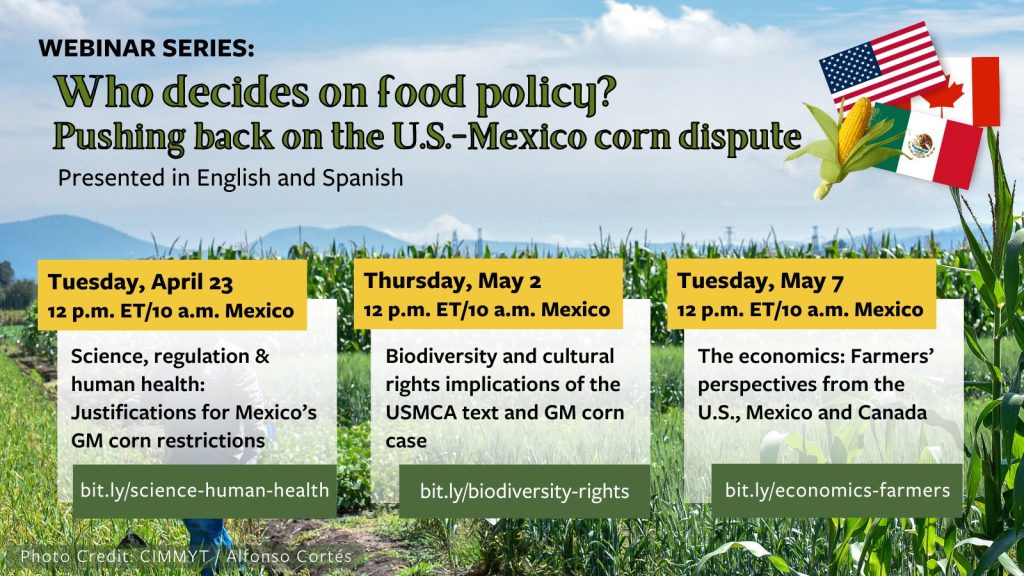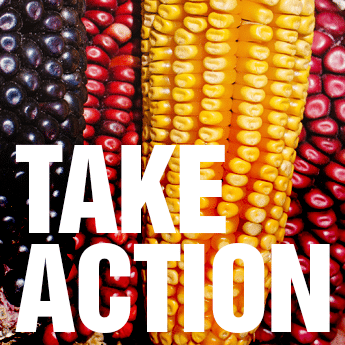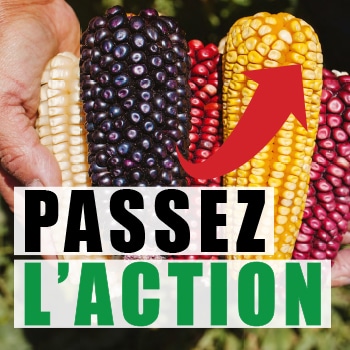Trade
Free trade agreements are being used to push governments to adopt new policies and regulation on biotechnology, along with new rules that restrict farmers’ from saving, exchanging and breeding seeds.
The Canada-United States-Mexico Agreement (CUSMA or USMCA) entered into force in 2020, updating the North America Free Trade Agreement (NAFTA) (1994). CUSMA has a section on “Agricultural Biotechnology” but the agreement does not oblige any country to approve a GMO that is approved in another country, and it does not require countries to accept the scientific assessments and risk calculations of other countries. CUSMA mandates transparency, consultation, and science-based decision-making.
CUSMA trade dispute panel rules against Mexico’s ban on GM corn
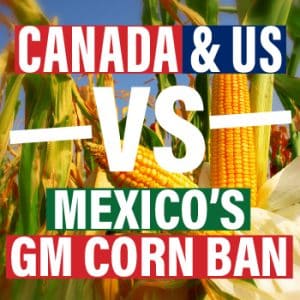 December 20, 2024: A CUSMA/USMCA trade dispute panel has ruled that Mexico must lift restrictions on the use of GM corn in food: “the Panel recommends that Mexico bring its Measures into conformity with its USMCA obligations under Chapters 2 and 9 of the USMCA. The Panel accepts that Mexico is seeking to address genuine concerns in good faith, and suggests that such concerns be channeled into an appropriate risk assessment process, measures based on scientific principles, and in dialogue among all USMCA Parties to facilitate a constructive path forward.” Analysis, Mexico’s path to food sovereignty undercut by USMCA decision, Institute for Agriculture & Trade Policy, February 2025.
December 20, 2024: A CUSMA/USMCA trade dispute panel has ruled that Mexico must lift restrictions on the use of GM corn in food: “the Panel recommends that Mexico bring its Measures into conformity with its USMCA obligations under Chapters 2 and 9 of the USMCA. The Panel accepts that Mexico is seeking to address genuine concerns in good faith, and suggests that such concerns be channeled into an appropriate risk assessment process, measures based on scientific principles, and in dialogue among all USMCA Parties to facilitate a constructive path forward.” Analysis, Mexico’s path to food sovereignty undercut by USMCA decision, Institute for Agriculture & Trade Policy, February 2025.
“Canada doesn’t even sell any corn to Mexico but sought to protect the interests of the biotechnology industry. This is a dangerous outcome that tramples national sovereignty and food sovereignty.” – Lucy Sharratt, Coordinator of the Canadian Biotechnology Action Network.
- Press Release – December 20, 2024: Civil society groups condemn USMCA dispute ruling on Mexico’s corn restrictions.
- Press Release – December 23, 2024: Trade dispute panel forces Mexico to end GM corn restrictions, CBAN, NFU, CCPA, Council of Canadians
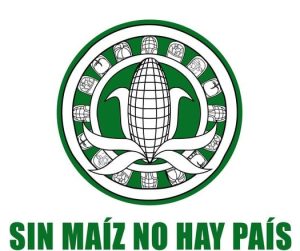
- Panel: Click here to find a summary of the panel decision or read the final report of the trade dispute panel,
- The Mexican government says it will comply but that its restrictions on GM corn are in line with the principles of protection of public health and the rights of Indigenous peoples, established in national legislation and in the international treaties to which it is a party.
- The national campaign in Mexico Sin Maíz no hay País (No Maize, No Country) has responded and is asking Canadians to share their statement.
- The US government response: “This decision ensures that U.S. producers and exporters will continue to have full and fair access to the Mexican market, and is a victory for fair, open, and science- and rules-based trade…It is also a victory for the countries around the world growing and using products of agricultural biotechnology…”
In 2020, the Government of Mexico announced that it will “revoke and refrain from granting permits for the release of genetically modified corn seeds into the environment” and phase out of GM corn imports by 2024 as well as a phase out the use of the herbicide glyphosate. In February 2023, Mexico issued a revised decree and the measures relating to GM corn in this decree are being challenged by the US government under CUSMA with support from Canadian government as third Party.
Background
A translation of the Mexican government’s Scientific Dossier on GM Corn and its Effects: Effects of GM corn on human health, the environment and biodiversity, including the biocultural richness of native corn in Mexico is now available. Click here to read the dossier.
- CBAN Article: Biotech Winner Takes All, Watershed Sentinel, May 9, 2024
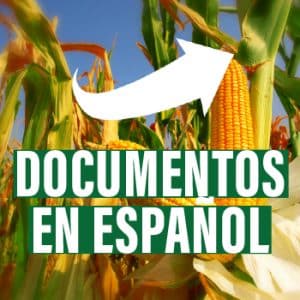
- CBAN Factsheet: Canada and the US Challenge Mexico’s Restrictions on GM Corn, March 2024
- CBAN Briefing: Canada & US vs. Mexico’s Ban on GM Corn: The CUSMA trade dispute champions the biotech industry over food sovereignty, January 2024
- CBAN Opinion Article: Mexico’s Precaution on GM Corn Safety Is Justified, Food Tank. March 5, 2024
- Documentos de RCAB en español
April 9, 2024 – Press Release: Canada argues against Mexico’s restrictions on GM corn
CBAN Report – April 9, 2024: Response to Canada’s Arguments Against Mexico’s GM Corn Restrictions
April 8, 2024 – Press Release: Canadians support the right of the people of Mexico to determine their own relationship with corn, National Farmers Union. In solidarity with Mexico, today 31 Canadian organizations stated their objection to Canada’s role in the trade challenge which aims to end Mexico’s restrictions on the use of genetically modified (GM) corn for certain foods. The groups are calling upon Canada to respect the seed sovereignty of Indigenous and peasant farmers in Mexico and their pursuit of food sovereignty.
Submissions from Parties to the trade dispute panel:
- Canada: Click here for the submission to the trade dispute panel from the Government of Canada, released April 4, 2024
- Mexico: Click here for the submission of arguments from the Mexican government defending their restrictions, released March 5, 2024
- United States: Click here for the submission from the United States, October 2023
January 9, 2024: At the request of the United States and Canadian governments, a trade dispute panel has rescinded an invitation to Canadian non-governmental organizations (NGOs) to submit official comments in the dispute under the Canada-US-Mexico Trade Agreement (CUSMA) over Mexico’s phase-out of genetically engineered (genetically modified or GM) corn. Read CBAN’s press release.
June 9, 2023: The Government of Canada has joined as a third Party to the trade dispute:
- Ministers Bibeau and Ng Statement on Mexican measures that impact Agricultural Innovation: “Agricultural innovations continue to help address shared global challenges such as food security, sustainability, and climate resilience. Canada shares the concerns of the U.S. that Mexico’s measures are not scientifically supported and have the potential to unnecessarily disrupt trade in the North American market.”
- Notice of intention to join the consultations as a third Party – Mexican measures concerning genetically engineered products: “Canada has a substantial interest in the matters raised by the United States in its consultations request. Like the United States, Canada is concerned with the rejections of certain biotechnology product applications covering GE corn, canola, cotton, and soybean.”
Analysis
- Resource page: Food Sovereignty, Trade and Mexico’s GMO Corn Policies. Institute for Agriculture and Trade Policy (IATP)
- May 9, 2024: Biotech Winner Takes All, CBAN
- January 25, 2024: Why Mexico’s 2023 ban on GM corn is the right move, Trade Justice Group of the Northumberland Chapter of The Council of Canadians.
- October 3, 2023: We must Respect Mexico’s Food Sovereignty. National Farmers Union
- July 21, 2023: Despite U.S. Pushback, Mexico’s Fight to Ban Genetically Modified Corn is Not Over. Lorena Rios.
- June 22, 2023: Canada and the U.S. are using free trade rules to attack Mexican food sovereignty, Canadian Centre for Policy Alternatives
- May 30, 2023: Mexico calls U.S. bluff on science of GMO corn restrictions, Timothy Wise, Institute for Agriculture and Trade Policy.
- March 23, 2023: Click here to read the letter from CBAN and the Council of Canadians to International Trade Minister Ng.
- January 6, 2023: 28 Canadian organizations called on the federal government to support Mexico’s phase out. Press release: Mexico under pressure from U.S. Over GMO and Glyphosate Ban
- October 2022: Free trade agreements: Mexico. How to get out of corporate submission? GRAIN
- March 2022: Mexico retains the right to take the precautionary measures it deems necessary to protect public health and the environment. See Understanding the Agricultural Biotechnology Provisions in the U.S.-Mexico-Canada Agreement, Institute for Agriculture & Trade Policy.
CETA and Biotechnology
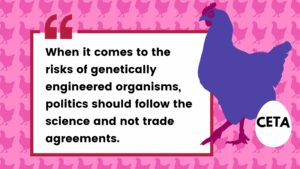 The Canada-EU Trade Agreement (CETA) between Canada and the European Commission entered into force in 2017. The goal of CETA regarding biotechnology is to overcome “market access issues”. Under the provisions of CETA, Canada and the EU created a Bilateral “Dialogue on Biotech Market Access Issues” to “strengthen bilateral cooperation on biotechnology“ (Article 25.2) including to discuss relevant national legislation.
The Canada-EU Trade Agreement (CETA) between Canada and the European Commission entered into force in 2017. The goal of CETA regarding biotechnology is to overcome “market access issues”. Under the provisions of CETA, Canada and the EU created a Bilateral “Dialogue on Biotech Market Access Issues” to “strengthen bilateral cooperation on biotechnology“ (Article 25.2) including to discuss relevant national legislation.
April 14, 2022 – EU Commission: answering science with political statements: Letter shows impact of trade interests and CETA. In a letter written in April 2022, the EU Commission states there would be no new and specific risks caused by the unintended effects of CRISPR/Cas applications. This letter was a response to a joint letter sent by the German Union of Peasant Farmers (AbL) and Testbiotech. Testbiotech argues that this statement of the Commission is not based on facts but largely driven by trade interests such as those supported by the free trade agreement CETA (The Comprehensive Economic and Trade Agreement) between the EU and Canada.
CETA Dialogue Meetings
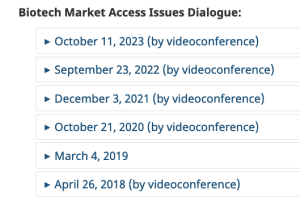 There have been six dialogue meetings 2018-2023. In 2022, Canada’s summary report from the meeting stated that “Canada also underlined and shared its support for an intersessional meeting of the Dialogue, which could allow for more technical and focused discussions.”
There have been six dialogue meetings 2018-2023. In 2022, Canada’s summary report from the meeting stated that “Canada also underlined and shared its support for an intersessional meeting of the Dialogue, which could allow for more technical and focused discussions.”
Canada encouraged the EU to approve GM proposals as fast as possible:
- 2022: “Canada called on the EC to conduct approvals for genetically modified (GM) events as efficiently as possible.”
- 2021: “EFSA pointed out that the overall time for risk assessment decreased the last two years as a result of a leaner internal process.”
- 2020: “Canada encouraged EFSA to consider changes to its procedures that would improve the efficiency of the risk assessment process, with a view to bringing the timelines closer to the targeted timeframe of six months. Canada also encouraged EFSA to improve the functioning of the system from an applicant’s perspective.”
- 2019: “Canada stressed the importance of timely approvals of biotechnology events in the EU and the importance for the EU to ensure that proposals for GM events are processed as fast as possible within the procedures laid down in EU approval legislation.”
Canada expressed concern over the EU approach of assessing individual events followed by a full assessment of the stacked product as disproportionate to risk:
- 2020 & 2021: “Canada expressed concern over the EU approach of assessing individual events followed by a full assessment of the stacked product as disproportionate to risk.”
Canada encouraged the EU to “adopt a pragmatic approach to managing LLP” – Low Level Presence:
- 2019: “Canada emphasized the importance for countries, including the EU, to adopt a pragmatic approach to managing LLP to avoid unnecessary disruptions to trade.”
- 2019: “Canada emphasized the value of having an EU contribution to the international LLP discussion and invited the EU to participate in the next meeting of the Global LLP Initiative (tentatively scheduled for September 2019).”
Canada encouraged the EU to “consider a pragmatic approach to compliance [of new breeding techniques (NGTs)], in recognition that many products of gene editing are not distinguishable from their conventional counterparts.”
- 2019: “Canada, in full respect of the independence of the CJEU and its interpretation, enquired whether the Commission envisaged a new legislative proposal to address products from new plant breeding techniques and noted that different approaches are applied by many other countries in the world.”
- 2021: “Canada encouraged the European Commission to develop innovation friendly, trade-facilitative, science-based policy options that align with existing and emerging international regulatory approaches, noting that many products developed through NGTs will, for the most part, be similar or undistinguishable from products that could have otherwise been produced through conventional breeding.”
Other excerpts:
- 2018: “Canada expressed concerns over specific issues of the EU risk assessment, including the existing timelines for risk assessing GMO applications, including stacked events, the EU’s 10-year expiry of authorizations which then necessitate renewal applications, and the retroactive application of EFSA guidance documents.”
- 2019: “The Commission enquired whether Canada is considering a system that would provide information on the techniques (including precision biotechnology techniques) used for the development of seeds. Canada replied it is not opposed to transparency on this point, and discloses information on the techniques used in the development of products that are authorized for use as food and feed, and for environmental release in Canada.”
CETA and Farmers
The National Farmers Union argued that the trade deal will concentrate even more power in the hands of corporations, at the expense of farmers and food sovereignty.
- December 12, 2014: Agricultural Impacts of the Canada-European Union Comprehensive Economic and Trade Agreement, National Farmers Union, Submission to the House of Commons Standing Committee on Agriculture and Agri-Food regarding, December 5, 2014
- Click here for some history of CETA objections from the National Farmers Union.
UPOV’91
As UPOV has expanded, the global seed market has been taken over by a cartel of agrochemical companies. Who Profits Under UPOV? GRAIN, November 2022.
The International Union for the Protection of New Varieties of Plants (UPOV) is an intergovernmental organization that has created model laws that allow seed developers to claim property rights similar to patents. Canada joined UPOV and adopted its 1978 model law by passing the Plant Breeders’ Rights Act in 1990. The 1991 model law, known as UPOV ’91, enhances the rights of multinational seed companies such as Bayer, Syngenta, Dow-DuPont, Limagrain, Viterra, Pioneer, and Cargill, while restricting farmers’ rights. Canada formally adopted UPOV ’91 on June 19, 2015.
In the early 1990s, through the World Trade Organisation (WTO), seed corporations successfully lobbied governments to give up sovereignty over their seeds and give in to the system of intellectual property rights on plant varieties. This process resulted in the strengthening of UPOV, the hitherto little-known common regime set up by a small group of European countries, aimed at privatising seeds and protecting them in the interest of its plant breeders. Now, various trade negotiations negotiated outside the WTO are being used to bring countries into UPOV, or follow its rules known as UPOV 91. Free trade agreements (FTAs) have become a tool for industrialised countries, working with corporate lobbies, to push governments of the global South to adopt new rules that restrict farmers’ from saving, exchanging and breeding seeds.
According to the National Farmers Union, by adopting UPOV ’91 Canada has reduced the freedom and independence of Canadian farmers by making it much more difficult to save and reuse seed of new plant varieties, forcing them to pay more for seed; opened the door to an end-point royalty system that would allow seed companies to collect royalties on the whole crop grown from new varieties – including each cut of hay on forage crops – if they cannot, or do not collect it on the seed.; transferred millions of dollars every year from farmers to plant breeders’ rights (PBR) holders; and consolidated the power and control of world’s largest agribusiness corporations over seed, and thus over the Canadian farming and food system.
Trade deals pushing UPOV: an interactive map – December 2021: A new map based on GRAIN’s dataset of signed FTAs in the past 20 years can help visualise which countries use free trade deals to push corporate control over seeds and which countries are under attack from these trade deals.
Trans-Pacific Partnership (CPTPP)
The Comprehensive and Progressive Agreement for Trans-Pacific Partnership (CPTPP) – formally known as the Trans-Pacific Partnership (TPP) – is an expansion of the Trans-Pacific Strategic Economic Partnership Agreement (TPSEP or P4) that was signed by Brunei, Chile, New Zealand, and Singapore in 2005. The CPTPP is a free trade agreement between Canada and 10 other countries in the Asia-Pacific region: Australia, Brunei, Chile, Japan, Malaysia, Mexico, New Zealand, Peru, Singapore and Vietnam. It entered into force on December 30, 2018 in the first six countries to have ratified the agreement: Canada, Australia, Japan, Mexico, New Zealand, and Singapore.
The text of the TTP was released on Nov 5, 2015. Article 2.29 (in Chapter 2) pertains to “Trade of Products of Modern Biotechnology.” There are no restrictions in the TTP to the domestic regulation of GM foods, including the ability of GM foods to be labelled. The text specifically addresses the issue of “Low Level Presence“, creating a working group for more cooperation on this and other GMO related issues.
The TTP will however have other impacts – we know that changes to milk quotas in Canada will mean that milk produced in the US will now enter Canada, and some of this milk could be produced through the use of recombinant Bovine Growth Hormone (BGH). In 1999, Health Canada denied approval to BGH on animal health grounds, after ten years of protest from Canadian consumers and farmers. Read the blog from the Council of Canadians here.
Other Trade News
November 2009: GM flax contamination from Canada continues to be found in the EU. Canadian flax farmers face depressed prices and their European market is closed.
October 22, 2009. Press Release: European Consumers Warned that Trade Deal with Canada could be used to Weaken GMO Regulations
July 20, 2009. Press Release: Genetically Modified Food: Canada capitulates and abandons fight with Europe at the WTO.
Canada and Europe have signed a bilateral settlement which ends Canada’s dispute with the EU at the World Trade Organization (WTO) over genetically modified foods – this leaves the US and Argentina alone in their WTO dispute with Europe over GM food and requires Canada to meet with EU officials twice yearly to discuss GM issues. The Canadian Government is trying to spin this new agreement as improving market access for GM crops in Europe, but this access already exists and the obstacle for Canadian food exports to Europe is continued consumer rejection. According to Monsanto, by March of this year, the European Commission had already approved all of the GM seeds currently used in Canada.
April 21, 2010 – Press Release, National Farmers Union: Secret Text of Canada-EU Trade Deal Released: The agreement may be the largest single issue on farm-policy horizon
See the National Farmers Union and other unions discuss the impacts on YouTube.
Click here for background information: CBAN Briefing: WTO dispute over Genetically Modified Organisms: Canada, Argentina, US vs European Union, July 20, 2009
On May 13, 2003, Canada filed a complaint, in tandem with complaints filed by Australia and the US, to the World Trade Organization (WTO) Dispute Settlement Body regarding European Commission delays in approving GMOs. Canada, US and Argentina alleged that the EU had put in place a de facto moratorium on GM approvals and that they had:
• Refused to give the approval to a number of new GM foods,
• Stopped processing applications for new GMOs,
• Not taken action to stop EU member states banning GM products.
In 2006, WTO dispute panels ruled that the EU had put in place an illegal moratorium. Canada and the EU continued discussions as the EU requested more time to address the outcome of the WTO ruling. In 2009, the European Union and Canada have signed a final settlement of the WTO dispute that Canada brought against the EU in May 2003 regarding the application of its legislation on biotech products. “The mutually agreed solution provides for the establishment of a regular dialogue on issues of mutual interest on agriculture biotechnology.” Click her to read the European Union Press Release July 15, 2009.
Resources
- The National Farmers Union, Trade Campaigns.
- Understanding the Agricultural Biotechnology Provisions in the U.S.-Mexico-Canada Agreement, Institute for Agriculture & Trade Policy, March 2022
- The powers pushing for the planet-wrecking EU-Mercosur trade deal …and using it as a license to greenwash, Friends of the Earth Europe, March 22
- EFTA-Mercosur: another low blow to climate, peoples’ rights and food sovereignty, GRAIN, May 2022
- Food, Agriculture and CETA: The possible implications of a second generation, comprehensive trade agreement, A presentation by Lauren Baker, Toronto Food Policy Council, February 2011
- Trade agreement with Europe threatens Canada’s farmers, by Terry Boehm, President, National Farmers Union, Common Ground Magazine, Nov 2010
- New free trade agreements: normalising the brutality of transnational supply chains, GRAIN, 2017

